The Supreme Ruler has assigned Grand Master Yuan Shi Tian Zun the responsibility of assessing disciples’ virtues and vices, and thereafter conducting investiture ceremonies for the selected individuals whose names will appear on the investiture board. As a result, Grand Master Yuan Shi closed down the cave entrance and ceased lecturing the sutra. Furthermore, he devised a plan for his disciple, Jiang Ziya, to depart from the mountain and assume the role of an army General, in alignment with the celestial plan.
One day, Grand Master Yuan Shi gave a command to Bai He, who immediately summoned Jiang Ziya. The Grand Master patiently waited for Ziya to complete the kowtowing ceremony before speaking to him. How long have you been here?” the Grand Master asked.
“This disciple began cultivating the Way at 23 and is now 72,” Ziya respectfully replied.
Yuan Shi said: “Now, as the Shang Dynasty’s fortune declines and the West Zhou Dynasty rises, you are tasked to return to the earthly realm on my behalf. Your mission is to serve the nation and contribute to the creation of the ‘Investiture of the Gods’ tableau, embodying the principle ‘A general in life, a deity in death.’ This ensures that your decades of cultivation will not go to waste.”
Jiang Ziya implored, “I left my home for the mountains, committing myself fully to seeking enlightenment and transcendence on the “Immortal” path. For forty years, I have dedicated myself to renouncing worldly ties and pursuing the Dao (Spiritual Path), understanding well that spiritual growth and enlightenment are challenging and do not occur swiftly. Given the time and devotion I have invested in following you, I earnestly appeal to you for salvation. How could you bear to send me back to the mortal realm?”
The elder Immortal of the South Pole intervened and advised Ziya, stating, “This is your fate. Go down to help the world. After completing your task, you will be able to come back and continue your spiritual practice. This is for the greater good.”
Reluctantly, Ziya packed his belongings and, with a heavy heart, asked the Grand Master his final question: “Now that I’ve obeyed your order to return to the world, can you enlighten me about my fate?” The Grand Master replied, “I have eight verses that encapsulate your entire life. Remember them well.” With reluctance, Ziya gathered his belongings and, feeling a deep sense of sorrow, posed one final question to the Grand Master: “Having followed your directive to re-enter the mundane world, may I request insight into my destiny?” The Grand Master replied, “There are eight verses that foresee your life’s journey. Commit them to memory.”
A decade of hardship, in tattered garments
Forcing a smile, shunning excessive sorrow
On the rocks of Panxi stream, patiently fishing,
Awaiting the royal carriage, to the palace bound,
At eighty, adorned with a jade belt’s honor,
Wearing the General’s insignia at ninety-three,
Year of the Horse sees vassals’ allegiance
By ninety-eight, presiding over the Investiture.
Then the Grand Master added, “Even as you venture back into the world, you will come back to us here on this mountain.”
After bidding farewell to his master and friends, Jiang Ziya left the palace of Jade Emptiness. Accompanied by the Immortal of the South Pole, they journeyed until reaching the Unicorn Cliff. There, the Immortal reassured Jiang Ziya, “Grand Master has already given you clear instructions, so there’s no need to be overly anxious. Today, we part ways, but our paths will surely cross again.” Jiang Ziya expressed his gratitude with a bow before bidding farewell to the Immortal of the South Pole and descending the mountain.
Commentary
There are generally two stages in any spiritual practices: passive and active. Initially, practitioners withdraw from worldly concerns, seeking serene and desolate places for deep meditation. They contemplate tangible and intangible principles of the universe and human existence to discover the essence of the divine order. Engaging in rigorous practices, body discipline, and intricate meditation forms, they may seem to torment themselves or behave eccentrically, all in pursuit of salvation and enlightenment.
This is the emergence phase, a necessary stage in their learning and spiritual development, often carrying a negative sentiment and involving a denial of present life’s realities. As some meditation masters say, “a river ceases to be a mere river, and a mountain ceases to be a mere mountain.”
However, evolving from the initial concept of dualities and denial to transcend reality in the quest for Nirvana (Paradise or Liberation) practitioners gradually realize that the Way (or Paradise) and spiritual value are not found in self-mortification, the discrimination between good and bad, or the scented lotus separated from its muddy pond.
This realization stems from encountering the light indicative of life beyond physical death. Through peaceful serenity in meditation, stepping into Nirvana, and witnessing the marvelous mysteries of heaven during Samadhi (the deepest state of meditation), they directly and intuitively engage with spiritual life. These individuals, known by various titles like Saint, Arhat, and Buddha, are those who have genuinely and profoundly experienced the spiritual realm.
Having undergone these profound experiences, they find peace of mind, free from the fear of death ending their journey. Freed from the anxieties and sufferings that afflict many during life’s turbulent moments, they now navigate its flow, embracing its unpredictability. They share their insights with others, living an existence akin to everyone else’s but without the worries, fears, and ignorance that often prevail. Engaging in ordinary activities such as eating, drinking, resting, sleeping, and working, they experience both joy and sadness with equanimity.
However, their liberated spirit originates from transcending the boundaries of life and death, marking the moment they entered what various religions term as Nirvana or Paradise. Emerging from their seclusion into the secular world, they commit themselves to serving humanity. This transition is often described as “leaving the mountain” and reflects the mental clarity expressed by Zen practitioners: “Mountains are mountains, and rivers are rivers.”
Instead of renouncing the world, they now immerse themselves in it as enlightened beings, actively contributing to its betterment, guided not by personal ambition but by the will of a higher power. This phase is commonly referred to as the active stage of spiritual development and resonates with the principles of Mahayana (Great Vehicle) Buddhism. It encapsulates profound truths: Sorrows lead to enlightenment (Bodhi); Life and Death are Nirvana; the Buddha’s teachings (Dharma) are inherently intertwined with the world.
Related Post
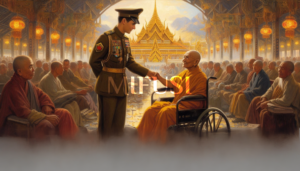
Story 14 – Invoking Uncle Ho
Story 14 - Invoking Uncle Ho Câu chuyện số 14 - Niệm danh cụ Hồ by ThầyGià on 12 November...
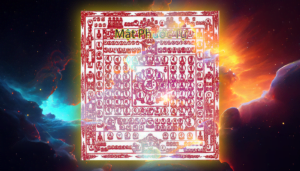
Chapter I: VI – HOMA (Part 6/6)
VI. HOMA (Goma, jap): Homa is the "Fire" ritual meditation. Originating in ancient India, it was later appropriated to Buddhist...
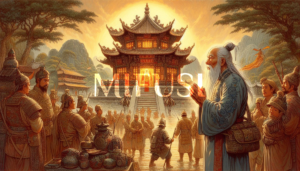
Story 6 – Deity Le Van Duyet
Story 6 - Deity Le Van Duyet Câu chuyện số 6 - Thần Lê Văn Duyệt by ThầyGià on 12...

RELIGIOUS VIEWS ON THE ORIGIN OF LIFE AND THE UNIVERSE
In attempting to study religion, people often get frustrated and have much to think about the many serious controversial religious...
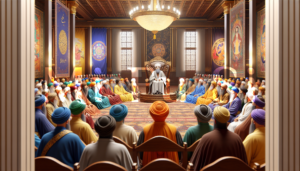
Which Religion Reigns Supreme?
Which Religion Reigns Supreme? (Đạo Hay Nhất! by như-ý on Mon Feb 09, 2009 3:05 pm Translated by Xiaobaiyun.) The...
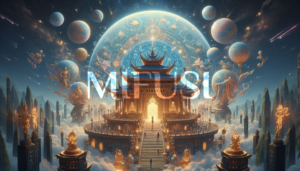
Dragon Flower Prophecies
Dragon Flower Prophecies Những tiên tri liên quan đến hội Long hoa; by NamSơn on Sat Jan 31, 2009 3:20...
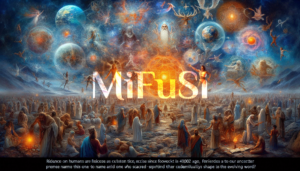
The Celestial Government
The Celestial Government Thiên Đình - Guồng máy siêu hình by Triệu Nghiêm on 07 Tháng 9 2021, 18:52; translate...
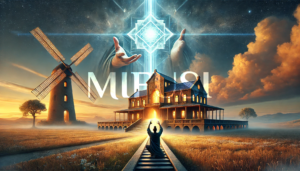
Visions from Wish Fulfilling Yantra #51
Visions from Wish Fulfilling Yantra #51 TCTĐ51: Ngôi nhà tri thức trên thảo nguyên by thachanhtrang on 15 May, 2016...
